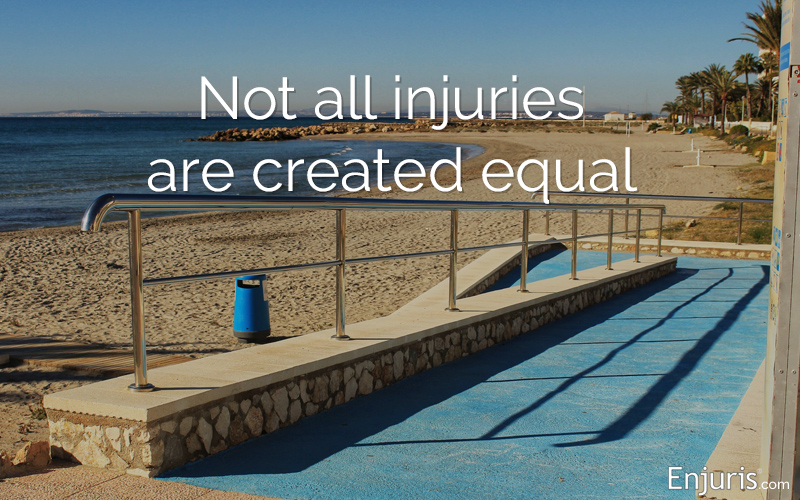
When is a personal injury considered “catastrophic”?
Logan Wood was tackled during a 2016 North Myrtle Beach Middle School football game. After the tackle, the South Carolina native told his coaches that he was having difficulty maintaining his balance.
Nevertheless, Logan was sent back into the game where he showed signs of confusion. At one point, Logan could be seen staggering down the sidelines and attempting to continue a play well after the whistle.
The day after the game ended, Logan was diagnosed with a serious brain injury. As a result of the injury, Logan continues to experience significant short-term and long-term memory loss.
On April 15, 2021, a Horry County jury found that the school district was negligent in failing to prevent Logan’s head injury because they didn’t require an athletic trainer to be present on the field and they failed to pull him from the game.
All injuries are bad, but some injuries, such as traumatic brain injuries (TBI) and spinal cord injuries, are considered catastrophic.
Let’s take a look at catastrophic injuries and how they may differ from other types of injury claims.
What is a catastrophic injury?
There is no universally accepted definition of “catastrophic injury,” but most people use the term to describe injuries that cause long-term damage.
Common examples of catastrophic injuries include:
- Spinal cord injuries
- Traumatic brain injuries
- Amputations
- Severe burn injuries
- Blindness
- Deafness
What are the common causes of catastrophic injuries?
Just about any accident can result in a catastrophic injury, but certain accidents are more likely to cause catastrophic injuries than others. These include:
When can you sue for a catastrophic injury in South Carolina?
As is the case with all personal injuries, you first need to prove that someone else was responsible for your catastrophic injury in order to recover damages.
What you need to establish to prove fault will depend on the specific cause of action (the legal grounds and alleged facts of your case). The vast majority of personal injury cases are based on negligence.
Negligence requires the plaintiff to establish that:
- The defendant owed the plaintiff a duty of care
- The defendant breached the duty, and
- The breach was the direct and proximate cause of the plaintiff’s injury.
Although the specific “duty of care” owed depends on the circumstances and the relationship between the parties, most people in most situations owe a duty to exercise reasonable care.
For example, when driving a motor vehicle, the driver owes a duty to exercise reasonable care to avoid harming others on the road. If the driver fails to do so (by, for example, driving while intoxicated), they’re responsible for the injuries they cause.
What damages can you recover after a catastrophic injury?
The main difference between catastrophic personal injury claims and other types of personal injury claims is the amount of damages (compensation) at stake.
Because catastrophic injuries typically require life-long treatment, they can be incredibly costly.
Catastrophic injury expenses may include:
- Emergency medical care
- Hospitalization
- Surgery
- Medication
- Physical therapy
- In-home care
- Home modifications to accommodate a disability
- Transportation costs
- Long-term care facility costs
In South Carolina, plaintiffs can recover 3 types of damages:
- Economic damages include the monetary losses caused by the accident (medical expenses, lost wages, in-home care, etc.).
- Non-economic damages include the non-monetary losses caused by the accident (pain and suffering, emotional distress, loss of consortium).
- Punitive damages are meant to punish the defendant and are only available in cases where the defendant acted willfully or recklessly.
Unfortunately, South Carolina caps certain types of damages. Although these damage caps don’t come into play in many types of injury cases, they often apply to catastrophic injury cases:
- When suing governments and government officials, damages are capped at $300,000 per person or $600,000 per occurrence
- In medical malpractice cases, non-economic damages are capped at $350,000 per defendant and can’t exceed $1.05 million for all defendants
- Punitive damages are capped at $500,000, or 3 times the actual damages (whichever is greater)
Catastrophic injuries that happen at work
Your employer has a legal responsibility to provide you with a safe place to work. Whether your accident was caused by your employer's failure to do so or simply by bad luck, you may be able to recover damages by filing a workers’ compensation claim.
Workers’ compensation is a form of insurance that provides financial benefits to workers who are injured on the job. Almost all South Carolina employers with 4 or more employees (full or part-time) are required to carry workers’ compensation insurance.
Workers’ compensation is an “exclusive remedy,” which means you must file a workers’ compensation claim (assuming you’re covered) instead of a personal injury lawsuit. The good news is that, unlike a personal injury lawsuit, you don’t have to prove fault to receive workers’ compensation benefits. The bad news is that workers’ compensation benefits are limited.
Statute of limitations for South Carolina catastrophic injury claims
South Carolina’s statute of limitations limits the amount of time a plaintiff has to file a lawsuit. If you fail to file your lawsuit within the statute of limitations, your lawsuit will be forever barred.
Here is a look at some of the time limitations that might apply to your catastrophic injury claim:
| South Carolina civil statute of limitations | ||
|---|---|---|
| Type of case | Statute of limitations | South Carolina statute |
| Personal injury | 3 years | S.C. Code § 15-3-530(4) |
| Workers’ compensation | 2 years | S.C. Code § 42-15-40 |
| Wrongful death | 3 years | S.C. Code § 15-3-530(5) |
If you sue the government (perhaps you were injured in a public park or library), you must do so under the South Carolina Tort Claims Act. The South Carolina Tort Claims Act gives plaintiffs 2 years to file a lawsuit, but it can be extended to 3 years if the plaintiff files a verified petition within 1 year.
If you’re ready to talk to a personal injury attorney about your catastrophic injury claim, you can use our free online legal directory to find one in your area. Most initial consultations are free.
See our guide Choosing a personal injury attorney.

